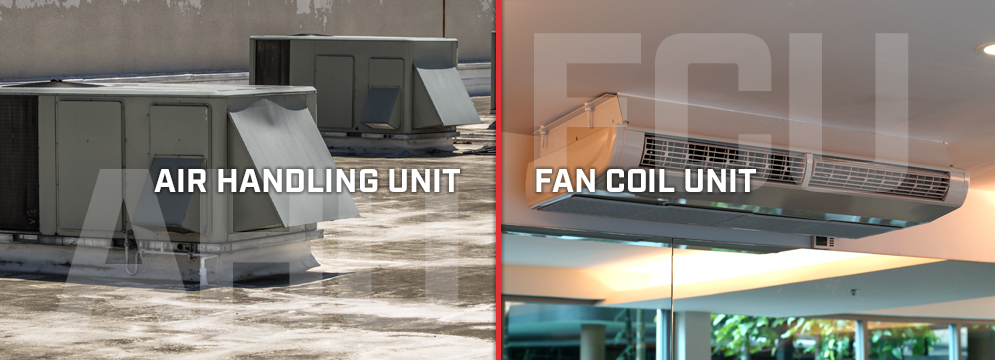The heating and cooling business is filled with confusing acronyms and many times Armstrong Plumbing, Air & Electric (formerly Armstrong Mechanical) is asked about AHU (air handling unit) vs FCU (fan coil unit) for commercial and residential applications in Lubbock, TX. Here is one of the best and simplest explanations of what they are:
- An AHU is a part of an HVAC system that distributes air into space through a duct.
- An FCU is a standalone system that circulates existing air in a small space.
Now, let’s take a closer look at how they work in real world applications.
DEFINING AN AHU
An AHU consists of multiple components, such as a blower and cooling and heating coils. This is a type of central HVAC in that it conditions and circulates air through the building’s ductwork. There are multiple design and configuration options allowing you to build an AHU customized for your building’s specific needs. The selection, design, and installation process involved with AHUs is extensive and expensive. Correct configuration is needed to ensure your HVAC system runs efficiently.
CLOSER LOOK AT FCUs
By definition, an FCU is not as complex. It is a singular system operating on its own providing heating and cooling to an area without ductwork. Unlike AHUs, FCUs do not bring in outside air and condition it. An FCU can only condition air that’s already present by pulling it in and moving back out through its heating or cooling coil. This means FCUs are typically used to heat or cool smaller areas. Typically, an FCU can cover about 1,600 square feet.
DECIDING WHICH IS BEST
In large buildings you are more likely to find AHUs as part of a central HVAC system. FCUs have the advantage of being much cheaper to purchase and install. They also come in a variety of configurations including wall or ceiling mounted and free-standing. This can make them a popular choice for some residential applications but are also used to work in conjunction with an AHU-based HVAC system. The FCUs can cover areas that are not connected to the centralized ductwork.
CALL TODAY
Call Armstrong today to learn more about which application is best suited to the heating and cooling challenges you face in Lubbock, TX. When you call, we can make an appointment to review your replacement or new construction project and provide you with a no-obligation estimate.








